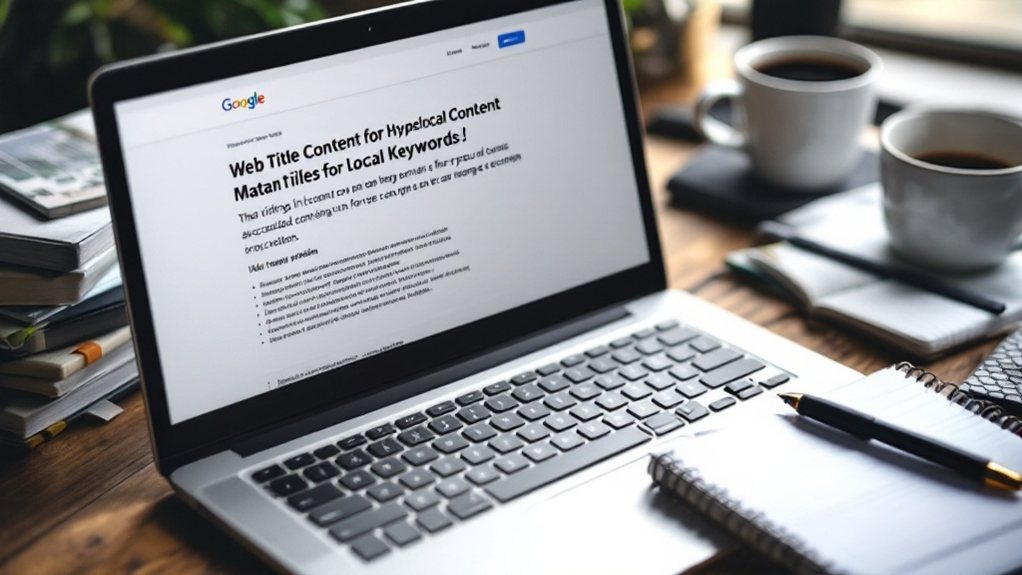To craft compelling content for hyperlocal keywords, you'll need to deeply understand your local audience's preferences, leverage specific neighborhood-level keywords, and optimize your online presence. By incorporating location-based details, leveraging user-generated content, and promoting your content through hyperlocal directories, you can create content that truly resonates with and drives engagement from your local customer base. Continue reading to dive deeper into strategies for effective hyperlocal content creation.
Understanding Your Local Audience

When crafting content for hyperlocal keywords, understanding your local audience is crucial. Analyze the demographics of your target area, including factors like age, income, and cultural preferences. Use geographic targeting to focus your marketing efforts on specific neighborhoods. Stay attuned to local trends and events to create relevant content. Engage with your community by participating in local events and building partnerships. Identify popular hobbies, product preferences, and community concerns to personalize your messages. Leverage local social media groups, encourage user-generated content, and collaborate with influential locals. Leveraging location-based analytics can provide valuable insights about your hyperlocal audience, enabling you to create content that resonates and fosters a strong community connection.
Identifying Hyperlocal Keywords

When targeting your local audience, it's important to identify hyperlocal keywords that include the names of specific neighborhoods or areas. Street names, local landmarks, and geographic features can also be valuable additions to your keyword strategy. Focusing on hyperlocal keywords can help you better connect with your local community and improve your visibility in search results. By incorporating these hyper-targeted keywords, you can better connect with your local community and improve your visibility in search results.
Geographic Location Targets
Identifying the right hyperlocal keywords is crucial for your content strategy. When choosing geographic location targets, consider the legal and ethical implications. Ensure data privacy, transparency, and compliance with regulations. Avoid misleading consumers through inappropriate use of hyperlocal keywords. Regularly review and update your content to maintain accuracy and relevance. Targeting specific neighborhoods or suburbs can help you connect with your local community more effectively.
| Google Keyword Planner | SEMrush | Ahrefs |
|---|---|---|
| Identify potential keywords | Analyze competitor insights | Comprehensive keyword research |
| Estimate search volume | Local SEO metrics | Competitor comparison |
| Popular tool for keyword research | Versatile keyword analysis | Detailed keyword capabilities |
Leveraging the right geographic location targets can enhance your local search visibility and relevance, ultimately driving conversions and fostering community engagement.
Specific Neighborhood Keywords
Focusing on specific neighborhood keywords is crucial for crafting hyperlocal content that resonates with your target audience. Incorporate the names of local neighborhoods, landmarks, and events into your page titles, meta tags, and content. Use schema markup to highlight the local context. Tailor your content to address the unique interests and concerns of each neighborhood, and regularly update it to reflect any changes or news. By optimizing your content with these specific neighborhood keywords, you'll enhance your local relevance, increase click-through rates, and attract higher-quality leads. Utilizing local keywords can increase foot traffic and local sales for businesses. This targeted approach can also lead to more efficient ad campaigns and lower cost-per-lead.
Optimizing Page Titles and Meta Descriptions

As the first point of contact for users in search engine results, optimizing your page titles and meta descriptions is crucial for capturing their attention and driving traffic to your website. Your page title should concisely reflect your content, naturally incorporating relevant keywords within 55-60 characters. Location-based keywords are at the heart of a successful hyperlocal SEO strategy, as they help search engines understand the geographic relevance of the business. Craft compelling meta descriptions that summarize your page's value proposition and encourage clicks, while staying within character limits. Align these elements with user search intent to improve visibility and engagement. Avoid over-optimization, keyword stuffing, and misleading content – your goal is to provide users with the information they need. Effective page titles and meta descriptions can significantly boost your hyperlocal SEO performance.
Incorporating Location-Specific Details
Incorporating location-specific details into your hyperlocal content is crucial for capturing the attention of your target audience. Leverage landmarks, neighborhood keywords, and local events to enhance your content's relevance. Include location-based data, such as crime statistics, to add depth. Referencing specific street names or historical sites increases local authenticity. Discuss the history of festivals and traditions to showcase cultural depth. Highlight unique local cuisine, art scenes, and artists to build a community-oriented narrative. Utilizing local partnerships can provide valuable insider information to share with your audience. Partner with local businesses to offer exclusive promotions and feature them in your content. Utilize precise geographic details, familiar terminology, and location-specific visuals to optimize for search engines and establish credibility with your local readers.
Leveraging User-Generated Content
Leveraging user-generated content can significantly boost your hyperlocal SEO efforts. Customer reviews and testimonials add credibility to your business, signaling to search engines that you're a trusted local entity. Encourage your customers to leave reviews, then monitor and respond to them to show engagement. Use these reviews as social proof on your website and social media, enhancing your authority and conversion rates. Specific local terms in reviews can also help with long-tail keyword optimization. Gather customer feedback to improve your services tailored to local needs. Utilize tools like Google My Business and review platforms to effectively manage your user-generated content and integrate it into your hyperlocal content strategy.
Highlighting Local Partnerships and Events
Creating content that highlights your local partnerships and events can be a powerful way to boost your hyperlocal SEO and community engagement. By partnering with nearby businesses, you can leverage their customer bases and tap into the local zeitgeist. Successful local business partnerships contribute to establishing a positive brand image within local communities. Consider these strategies:
- Co-create event-driven content that showcases your collaborative efforts, driving awareness and trust.
- Optimize location-specific content around local happenings to improve search visibility.
- Engage the community by involving them in event promotions and storytelling.
Nurturing strong local relationships and keeping a pulse on community activities will help you craft content that resonates with your target audience and solidifies your position as a trusted, hyperlocal authority.
Optimizing for Google My Business
Optimizing your Google My Business (GMB) listing is crucial for local search visibility. Manage online business information such as hours, phone number, and other attributes. Ensure your GMB details are accurate and consistent across online directories. Craft a compelling GMB description that incorporates relevant keywords and highlights your unique business offerings.
Consistent GMB Listings
Maintaining consistent Google My Business (GMB) listings is a critical component of effective local SEO. Ensuring your business's Name, Address, and Phone number (NAP) are identical across all online directories is paramount. This consistency:
- Reinforces your business's legitimacy and trustworthiness in the eyes of Google and potential customers.
- Facilitates accurate location data that improves your visibility in local searches.
- Prevents confusion and fragmentation that can negatively impact your local search rankings.
Regularly auditing your online listings and promptly updating any discrepancies is essential for maximizing the impact of your GMB optimization efforts.
Detailed GMB Descriptions
While crafting detailed Google My Business (GMB) descriptions may seem like a straightforward task, it's crucial to understand the guidelines and best practices to maximize their impact on your local SEO efforts. Ensure your description highlights your primary business category, as this helps search engines comprehend your main offerings. Maintain accuracy and relevance by providing factual information that aligns with your brand. Optimize the description's structure by prioritizing key details within the visible 250 characters. Incorporate unique selling points, target locations, and a clear call-to-action to engage potential customers. Remember, Google evaluates the description's content for keyword relevance, so integrate relevant keywords naturally without resorting to keyword stuffing.
GMB Optimization Tips
Crafting a well-optimized Google My Business (GMB) profile goes beyond simply filling out the basics. To maximize your local visibility, consider these GMB optimization tips:
- Enhance your business descriptions with relevant, location-specific keywords to showcase your local expertise.
- Regularly update your GMB profile with fresh content, such as Google Posts, to keep it engaging and up-to-date.
- Encourage and respond to customer reviews, as they not only build trust but also signal to Google your business's relevance.
Utilizing Schema Markup for Location Data
When it comes to optimizing your local SEO strategy, utilizing schema markup for location data is a crucial step. Schema markup enhances how search engines understand and display your business's critical details, like address, phone number, and operating hours. This structured data helps you stand out in local search results, increasing visibility and click-through rates. The preferred format is JSON-LD, which seamlessly integrates with your website. By accurately implementing location-specific schema, you can better manage multiple business listings and prepare for voice search optimization. Remember to maintain consistency across all marked properties for the best results.
Promoting Content Through Hyperlocal Directories
As a local business owner, promoting your content through hyperlocal directories is a strategic way to enhance your online visibility and drive more traffic to your website. By leveraging directories like Yelp, Google My Business, and Foursquare, you can create a consistent online presence, crucial for local SEO. To optimize your directory listings, consider these three key strategies:
- Optimize your listings with geo-targeted keywords to attract relevant search queries.
- Maintain accurate and up-to-date business information, including high-quality images, to build credibility.
- Engage with local review platforms, respond to customer feedback, and encourage positive reviews to boost your reputation.
Embracing hyperlocal directories can significantly improve your local search presence and connect you with your target audience.
Measuring and Refining Your Hyperlocal Strategy
Tracking the right performance metrics is crucial for measuring the success of your hyperlocal strategy. Optimizing your Google My Business listings is key for boosting local visibility. Leverage hyperlocal data to refine your content and target the most relevant audience.
Tracking Performance Metrics
To effectively measure and refine your hyperlocal strategy, you'll want to set up performance metrics that provide insights into your local search rankings, website traffic, and customer engagement. Track your local search rankings using Google Search Console, monitor website traffic from local search data via Google Analytics, and analyze click-through rates from local search results to gauge engagement. Additionally, evaluate the number of reviews and ratings received by your business, and utilize tools like Moz Local or BrightLocal for comprehensive SEO insights.
- Monitor local search rankings and website traffic data.
- Analyze click-through rates and customer engagement metrics.
- Employ comprehensive SEO tools for in-depth performance insights.
Optimizing GMB Listings
Optimizing your Google My Business (GMB) listings is crucial for refining your hyperlocal strategy. Choose accurate business categories to help Google understand your offerings better. Keep descriptions concise and organically incorporate 2-5 target keywords. Post content regularly to maintain an active and engaging listing. Collect customer reviews and respond professionally to enhance trust and rankings. Ensure your name, address, and phone number are consistent across all listings and directories.
Understand that customer reviews significantly influence GMB listing rankings. Stay informed about local developments and trends to integrate into your listings and content. Continuously monitor and update your GMB listings based on performance data and local changes. Consistently update your business information across all directories and citations to maintain consistency.
Leveraging Local Data
Measuring and refining your hyperlocal strategy is key to ensuring its effectiveness. Leverage geographical data, such as foot traffic patterns and sales trends, to assess campaign performance. Track local engagement metrics like likes, comments, and ratings to gauge audience interest. Additionally, monitor conversion rates to understand users' actions after engaging with your hyperlocal content.
To refine your strategy, conduct A/B tests, analyze user behavior data, and assess the impact of local events. Ensure your content is mobile-optimized and calculate the ROI to understand the profitability of your hyperlocal campaigns. By continuously measuring and optimizing your approach, you can better connect with your local audience and drive meaningful results.
